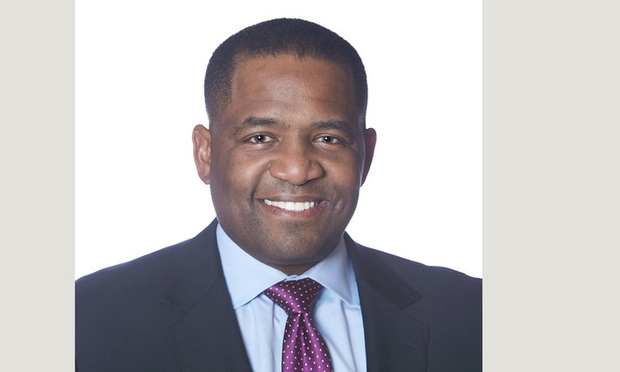Dentons Lands Ex-City Council President From DLA Piper for Public Policy Team
Ceasar Mitchell said he'll occupy "a sweet spot” between real estate law and public policy at Dentons.
June 13, 2019 at 04:10 PM
5 minute read
 Ceasar Mitchell, Dentons, Atlanta. (Courtesy photo)
Ceasar Mitchell, Dentons, Atlanta. (Courtesy photo)
Dentons has added another high-profile Atlanta politico as a partner to its marquee public policy practice—former Atlanta City Council president Ceasar Mitchell, who said he made the move from DLA Piper to combine his government and real estate development experience.
Mitchell joined Dentons' public policy practice on Monday to head the firm's local government solutions team, which advises clients on public-private initiatives around real estate and economic development.
“It was an opportunity I could not refuse,” he said. The public policy aspect “adds an additional arrow to my quiver for serving clients and growing my practice.”
As part of a real estate law team led by Maxine Hicks at DLA Piper, Mitchell worked on real estate development and financing matters. Hicks' team advises on large, complex mixed-use projects, often with a public-private component, such as the Atlanta Braves' new stadium in Cobb County and the adjacent shopping and restaurant zone.
Over the years, the Atlanta native said, he's also developed a public policy practice drawing on his 16 years of experience as an elected official. Mitchell served on the Atlanta City Council from 2002 to 2018, the last eight years as president, and pursued an unsuccessful run for mayor in the crowded 2017 race.
Mitchell said the chance to “create a sweet spot” between real estate law and public policy at Dentons was a big draw. Local government solutions such as public-private partnerships are often related to real estate development or, more broadly, economic development initiatives, he explained.
He said his clients include real estate developers and banking institutions but declined to name them without permission.
“I really enjoyed my time at DLA Piper. I practiced with Maxine Hicks for 15 years, and I have the greatest respect for the firm and the people there,” Mitchell said.
At Dentons, he said, he's joining a team of public policy lawyers who are well-known and respected in Atlanta, and are also firm leaders nationally and globally. Two partners who divide their time between Atlanta and Washington, Eric Tanenblatt and Gordon Giffin are, respectively, the global chair of Dentons' public policy practice and the firm's global vice chair.
“To be in arm's reach of this kind of leadership is exciting to me,” Mitchell said.
Many of Dentons' public policy lawyers are former elected officials. Dentons' Atlanta office includes former state Rep. Ed Lindsey, R-Atlanta, and two former Georgia Attorneys General, Sam Olens and Thurbert Baker.
Atlanta managing partner Sharon Gay and Steve Labovitz, both partners in Dentons' public policy practice, helped pioneer the use of tax allocation development financing for redevelopment in Georgia. Gay, an expert on land use, zoning and economic incentives, has advised on the development of Ponce City Market, Atlantic Station, Avalon, Glenwood Place and Krog Street Market. Labovitz has advised on tax incentives for large development projects, including the TAD and public financing used to build Atlantic Station, the nation's largest brownfield project.
TADs are a good example of public-private development initiatives, Mitchell said, adding that he originated four of Atlanta's 10 TADs during his City Council tenure: Turner Field, Metropolitan Parkway, Campbellton Road and the Hollowell Parkway-MLK Drive corridor. He also was a champion of Atlanta's best-known TAD, the Atlanta BeltLine.
Mitchell said TADs must be narrowly tailored to operate as an “inducement for economic development without eating away the tax base.”
TADs work by earmarking a portion of real estate property taxes for a tax-free bond that finances infrastructure and improvements to stimulate private investment in a designated area for a specified time period. The idea is that public entities, such as schools, give up a portion of their property tax proceeds but reap the reward of an expanded tax base down the road.
Public-private initiatives could be TADs or another type of government incentive structure, Mitchell said. “It's really about government partnering with the private sector to address needs and create solutions in a community by bringing redevelopment to an area that's lost its economic vitality.”
For these kinds of projects, Mitchell said, it's critically important to “understand the community you're in to find common ground so the public and private entities can work together and create a win-win.”
“It's what I've done as a lawyer and as an elected official,” he said.
Mitchell said he's out of politics, at least for now. “I'm a lawyer, father, husband—and I love my city. I will give to the city in whatever capacity I may serve, but right now I'm practicing law and loving it,” he said.
“But never say never,” he added.
This content has been archived. It is available through our partners, LexisNexis® and Bloomberg Law.
To view this content, please continue to their sites.
Not a Lexis Subscriber?
Subscribe Now
Not a Bloomberg Law Subscriber?
Subscribe Now
NOT FOR REPRINT
© 2025 ALM Global, LLC, All Rights Reserved. Request academic re-use from www.copyright.com. All other uses, submit a request to [email protected]. For more information visit Asset & Logo Licensing.
You Might Like
View All
After Breakaway From FisherBroyles, Pierson Ferdinand Bills $75M in First Year
5 minute read
Veteran Litigators Move From Sidley Austin to Alston & Bird's New Chicago Office
3 minute read
'Nerve-Wracking': Fires Disrupting but Not Halting Work of Distributed Firms' LA Lawyers
3 minute read
Alston & Bird Adds M&A, Private Equity Team From McDermott in New York
4 minute readTrending Stories
- 1'A Death Sentence for TikTok'?: Litigators and Experts Weigh Impact of Potential Ban on Creators and Data Privacy
- 2Bribery Case Against Former Lt. Gov. Brian Benjamin Is Dropped
- 3‘Extremely Disturbing’: AI Firms Face Class Action by ‘Taskers’ Exposed to Traumatic Content
- 4State Appeals Court Revives BraunHagey Lawsuit Alleging $4.2M Unlawful Wire to China
- 5Invoking Trump, AG Bonta Reminds Lawyers of Duties to Noncitizens in Plea Dealing
Who Got The Work
J. Brugh Lower of Gibbons has entered an appearance for industrial equipment supplier Devco Corporation in a pending trademark infringement lawsuit. The suit, accusing the defendant of selling knock-off Graco products, was filed Dec. 18 in New Jersey District Court by Rivkin Radler on behalf of Graco Inc. and Graco Minnesota. The case, assigned to U.S. District Judge Zahid N. Quraishi, is 3:24-cv-11294, Graco Inc. et al v. Devco Corporation.
Who Got The Work
Rebecca Maller-Stein and Kent A. Yalowitz of Arnold & Porter Kaye Scholer have entered their appearances for Hanaco Venture Capital and its executives, Lior Prosor and David Frankel, in a pending securities lawsuit. The action, filed on Dec. 24 in New York Southern District Court by Zell, Aron & Co. on behalf of Goldeneye Advisors, accuses the defendants of negligently and fraudulently managing the plaintiff's $1 million investment. The case, assigned to U.S. District Judge Vernon S. Broderick, is 1:24-cv-09918, Goldeneye Advisors, LLC v. Hanaco Venture Capital, Ltd. et al.
Who Got The Work
Attorneys from A&O Shearman has stepped in as defense counsel for Toronto-Dominion Bank and other defendants in a pending securities class action. The suit, filed Dec. 11 in New York Southern District Court by Bleichmar Fonti & Auld, accuses the defendants of concealing the bank's 'pervasive' deficiencies in regards to its compliance with the Bank Secrecy Act and the quality of its anti-money laundering controls. The case, assigned to U.S. District Judge Arun Subramanian, is 1:24-cv-09445, Gonzalez v. The Toronto-Dominion Bank et al.
Who Got The Work
Crown Castle International, a Pennsylvania company providing shared communications infrastructure, has turned to Luke D. Wolf of Gordon Rees Scully Mansukhani to fend off a pending breach-of-contract lawsuit. The court action, filed Nov. 25 in Michigan Eastern District Court by Hooper Hathaway PC on behalf of The Town Residences LLC, accuses Crown Castle of failing to transfer approximately $30,000 in utility payments from T-Mobile in breach of a roof-top lease and assignment agreement. The case, assigned to U.S. District Judge Susan K. Declercq, is 2:24-cv-13131, The Town Residences LLC v. T-Mobile US, Inc. et al.
Who Got The Work
Wilfred P. Coronato and Daniel M. Schwartz of McCarter & English have stepped in as defense counsel to Electrolux Home Products Inc. in a pending product liability lawsuit. The court action, filed Nov. 26 in New York Eastern District Court by Poulos Lopiccolo PC and Nagel Rice LLP on behalf of David Stern, alleges that the defendant's refrigerators’ drawers and shelving repeatedly break and fall apart within months after purchase. The case, assigned to U.S. District Judge Joan M. Azrack, is 2:24-cv-08204, Stern v. Electrolux Home Products, Inc.
Featured Firms
Law Offices of Gary Martin Hays & Associates, P.C.
(470) 294-1674
Law Offices of Mark E. Salomone
(857) 444-6468
Smith & Hassler
(713) 739-1250






